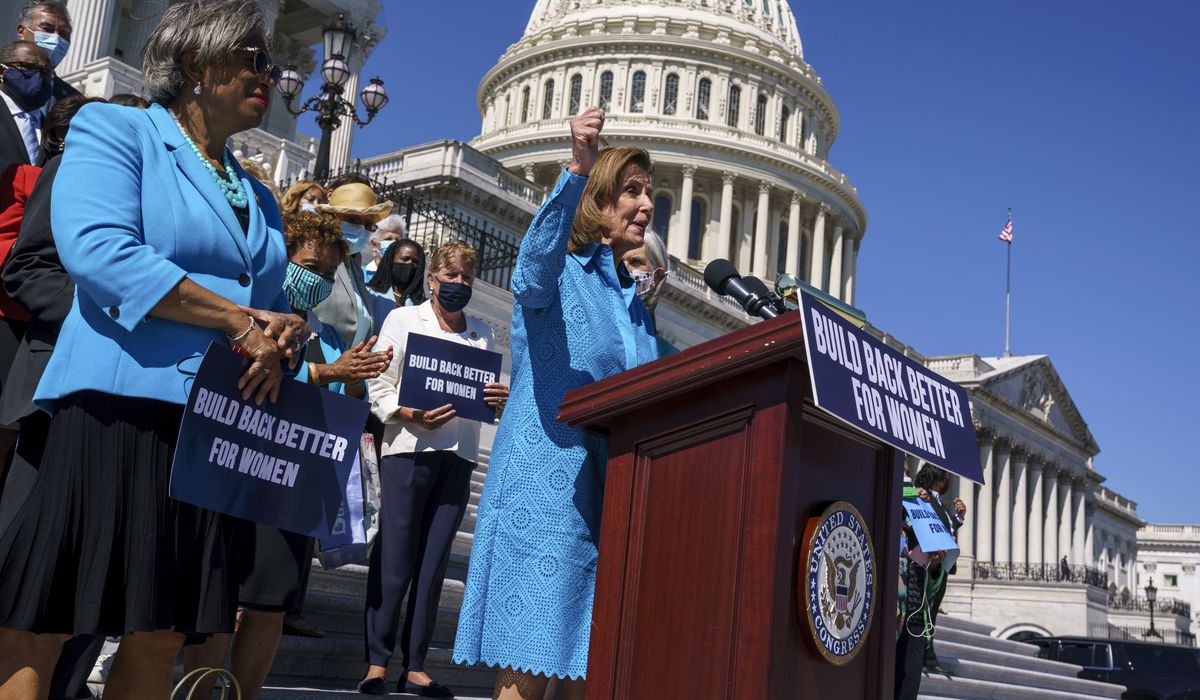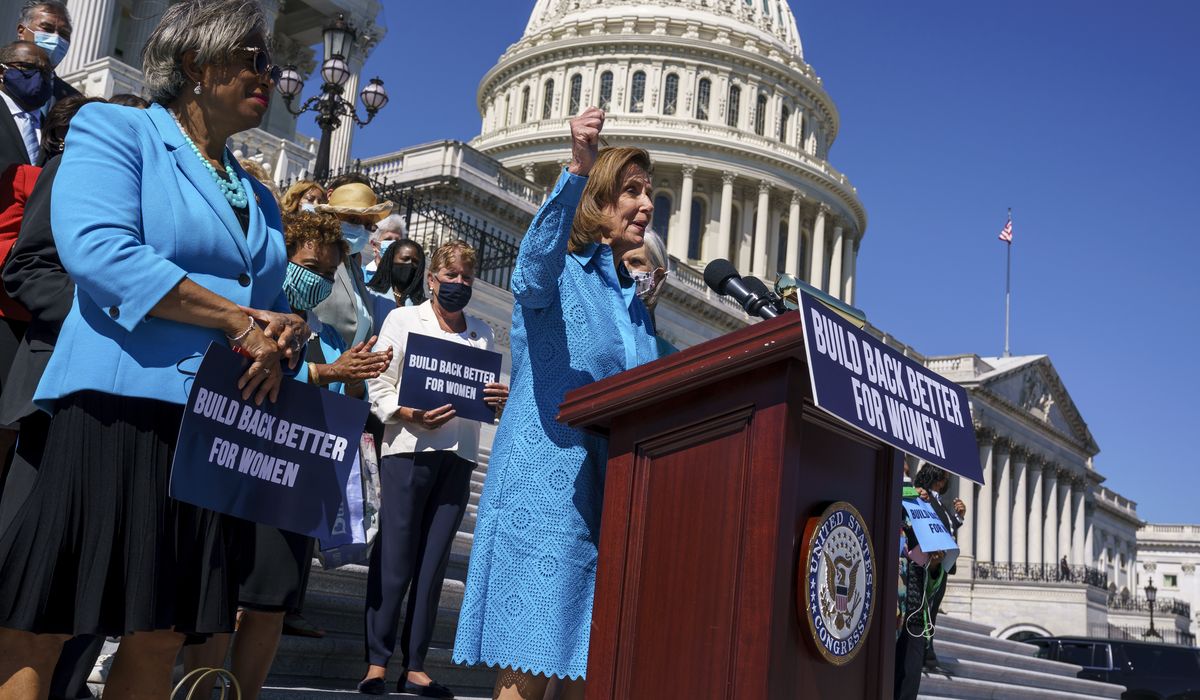
The thin margins in Congress and the high stakes for muscling through $5.7 trillion of new spending put House Speaker Nancy Pelosi in one of the tightest binds of her long political career.
With votes expected this week on two massive spending bills, Mrs. Pelosi has no room for error in bringing together far-left and moderate Democrats to score a desperately needed win for President Biden.
But Washington politicos, and the speaker herself, will tell you: Don’t bet against Nancy Pelosi.
“I don’t consider anything an uphill battle,” Mrs. Pelosi, California Democrat, recently told The Washington Times.
She has mastered an extensive repertoire of negotiating tactics to force defiant members in her caucus back in line. She dangles carrots, twists arms and pulls political levers to exert pressure on lawmakers in Washington and in their districts, said Democratic lawmakers and aides with firsthand experience of Mrs. Pelosi’s strong-arming.
“She has a database where she’s got a lot of resources at her fingertips to kind of reach down in members’ districts, and other stakeholders, to persuade people,” said a former Democratic leadership aide.
Until now, insiders say, the speaker’s efforts have been in the backroom cajoling or family conversation-style stages.
Mrs. Pelosi has enlisted reinforcements such as organized labor and liberal activists to call or pay visits to lawmakers’ offices. They are prodding Democrats to back both the $1.2 trillion bipartisan infrastructure bill favored by moderates and Mr. Biden’s $3.5 trillion social welfare bill, which is prized by liberals.
The pressure campaign is escalating quickly. The House could vote as soon as Monday on the infrastructure bill, and Mrs. Pelosi pledged to follow it up with a vote this week on the bigger liberal bill.
“Pelosi is not going to tell you how she’s going to retaliate or what’s going to happen. I think she’s far more subtle. Like you just know it’s coming,” the former staffer said. “And so it’s either going to be a committee assignment. It’s going to be a fundraiser. It’s going to be, ‘You’re not going on another international [congressional delegation].’”
Democratic lawmakers privately told The Times that Mrs. Pelosi’s intimate knowledge of each caucus member’s district allows her to make careful calculations about how far she can push them.
Going against the speaker’s wishes is risky, they say.
“One thing about her I’ve learned is, if you’re going to tell her you’re going to do something, tell her. If you’re not sure, then don’t say you’re going to do something and then don’t,” said Rep. Henry Cuellar, Texas Democrat. “That’s the one advice I give members because I’ve seen that a couple of times.”
Lawmakers are keenly aware of Mrs. Pelosi’s power and reach. As speaker, she can take things away from members if she feels they are not in line with the Democratic Party and do not discuss district issues with her before they think it is necessary to vote differently from the caucus. Leadership does not want surprises on the chamber floor or on social media.
Rep. Gerry Connolly, Virginia Democrat, said new members learn quickly that they must sometimes sacrifice their interests for Mrs. Pelosi.
“She can get people to give up their parochial personal set of interests and see a greater good, and she also has the ability to drop a hammer. She can be tough sometimes,” he said. “When I was a freshman, I got a lot of grief because I broke ranks on a couple of things. It was tough.”
The intraparty pressure campaign appeared in a letter to Democratic lawmakers from John Podesta, chief of staff to President Clinton. Mr. Podesta urged liberals to agree to reduce the $3.5 trillion package, which faces increasingly long odds of surviving in the Senate in its current form.
Democratic Party insiders said the letter, which was leaked to The New York Times, was no doubt the handiwork of Mrs. Pelosi.
Mr. Podesta said there is little chance that the Senate will pass the $3.5 trillion plan, which is the centerpiece of Mr. Biden’s agenda, and Democrats will lose both chambers in the midterm elections if they fail to unite on a smaller spending bill.
He admonished moderates for pushing back on the $3.5 trillion package, the most ambitious expansion of the welfare state since the Great Society of the 1960s.
“You are either getting both bills or neither — and the prospect of neither is unconscionable,” Mr. Podesta wrote. “It would signal a complete and utter failure of our democratic duty, and a reckless abdication of our responsibility. It would define our generation’s history and show that, when our time came, we failed, both for Americans now and in the years to come.”
Mrs. Pelosi’s calculus is further complicated by the partisan showdown over avoiding a government shutdown and suspending the federal debt limit to avert default.
Hank Sheinkopf, a veteran Democratic Party consultant, said that with a shutdown, a default and Mr. Biden’s agenda on the line, the speaker is engaged in a series of frank, closed-door discussions with her rank-and-file members.
In the conversations, he said, Mrs. Pelosi relays the reality that the fate of the Democratic majority in Congress and the fate of the spending bills are intrinsically linked.
Passing the spending bills “is a big accomplishment that sets the stage for more Democratic unity going into the 2022 election cycle,” Mr. Sheinkopf said.








